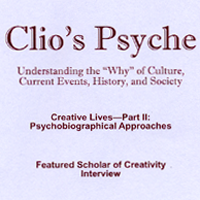
Psychodynamics
A Perspective on Reflective Consciousness and Psychohistory
by Marc-André Cotton*—Int. Psychohistorical Association
This article was published in Clio’s Psyche,Volume 22, No 1-2, June-September 2015.
Abstract: Specific to human nature, our reflective consciousness—not to be confused with guilt—drives us to reconsider destructive schemes of behavior so as to find ways to heal individually and collectively. This should leave an open field for psychohistorians.

Although well over 50, I consider myself a “young” European psychohistorian: I was trained by James Duffy through a 12-month psychohistory online course in 2000-2001 and only recently became aware of what David Lotto calls internal “turf wars” among American colleagues—not to mention the ongoing “trench warfare” waged by mainstream historians against psychological history. In my defense, I’m neither a psychoanalyst nor a historian and find it worthwhile to keep a respectful distance with heated debates.
“Debates” most often reflect the emotional dynamics of the group involved and do not always coincide with the search for truth. Incidentally, the psychoanalysis model is itself a case in point. In 1897 Freud disavowed his “seduction theory” in an attempt to calm down his colleagues of the Vienna Society for Psychiatry and Neurology, who were infuriated by the possible revelation of widespread sexual abuse among families of the Viennese bourgeoisie. At the time, chairman Richard von Krafft-Ebing—author of the quite popular Psychopathia Sexualis (1886)—labeled Freud’s Etiology of Hysteria “a scientific fairy tale,” and poor Sigmund confided that “word was given out to abandon [him]” (The Complete Letters of Sigmund Freud to Wilhelm Fliess, 1887-1904, translated by Jeffery M. Masson, 1986, 184-185). Freud then began to lose his clientele.
No such thing happened with his “theory of drives,” for which he gained worldwide recognition. Combined with Freud’s newly established belief that the etiology of neurosis was best explained by fantasy rather than trauma, the central position of the Oedipal complex in his psychoanalytical model ensured that such accusations never surfaced again—but banned for decades any real progress in the comprehension of how traumatic memories affect the human mind. Longtime disciples like Sándor Ferenczi and Otto Rank—who both challenged the emotional blindness of psychoanalysis—were excluded from psychoanalytic circles. The contribution of these precursors to the humanistic movement in psychology was eventually acknowledged, but Freud’s theory of drives remained hard science and still has damaging impact on many therapists and child abuse victims (see Valerie Rose Brinton’s review of Faye Snyder, ‘Politics and Memory: When One is Requested to Shut The Eyes’, Psychohistory News, Vol. 34, No. 1, Winter 2015).
Does this brief synopsis shed a light on the possible future of psychohistory? I believe so. First, if we are to set up “educational standards” in an upcoming psychohistorical institute, as advocated by Ken Fuchsman, we must guard against parochialism and keep an open mind. In particular, sorting “what is valuable and what is questionable” within the history of our field, as Fuchsman further suggests, might prove disputable and raise counterproductive antagonism. In addition, such an effort would guarantee neither professionalism nor intellectual respectability in the eyes of an ever-skeptical academic community. Establishing overly rigorous research methods could even have the opposite effect of nipping new flowers in the bud. In this respect, I was dismayed by what looked like deMause bashing on the Clio’s Psyche Listserv recently. As I saw it, participants in this quarrel concentrated on settling old scores with the master—whereas mature adults and psychohistorians in particular should be able to simply probe their classics for themselves.
This suggests a second thread of thoughts on psychohistory implied, as I understand it, in the “why” question. Defined as “the science of historical motivations” combining the insights of psychotherapy with the research methodology of social sciences (Association for Psychohistory), our field may well need “a broad, inclusive and tolerant stance,” as David Lotto recommends but must nevertheless affirm its unique nature. In our quest to unveil unconscious dynamics we do assume such processes exist and are active within the human mind and society. This is not the case with historical associations—whose “revulsion to insight” has been outlined by David Beisel—and might explain why other social sciences have hit major stumbling blocks with psychohistory. An exception to the rule, Harvard historian William Langer’s strong interest for psychological history stemmed in part from his younger brother Walter, a psychoanalyst who authored the World War II secret report, The Mind of Adolf Hitler for the Office of Strategic Services (OSS). As a matter of fact, both men worked for the U.S. intelligence community. Even academic psychology has been discredited as a forerunner in clarifying human motivations with its shameful support of the Bush administration’s torture program (Marc-André Cotton, “Poisonous Pedagogy: The Contentious Drift of Psychology,” Journal of Psychohistory, Vol. 40, No. 4, Spring 2013).
Humanity has been spanned by an all-time search for meaning and today’s troubled world is no different from that vantage point. Specific to human nature, our reflective consciousness—not to be confused with guilt—drives us to reconsider destructive schemes of behavior so as to find ways to heal individually and collectively. Such metacognition is central in the process of re-experiencing what has been experienced (trauma for instance) and ultimately “knowing that one is knowing” to fulfill realization. This should leave an open field for psychohistorians, but on behalf of what? As argued by Paul Elovitz, our uniqueness originates in a common willingness to expand our emotional awareness by the therapeutic experience. It is indeed how I came to psychohistory and what fuels my ongoing interest in this subject. In my experience, psychohistorians are by essence subject-centered and work outwards through this prism—whereas other social scientists remain mostly object-centered. It is therefore arguable that psychohistory should take fuller responsibility for its scope as a meta-discipline, that is, a field likely to make sense of all others.
Does this seem a bit narcissistic? Consider the concept of psychological mindedness that has been going around psychodynamic circles for some years. The expression refers to a subject’s capacity for self-reflection, including appreciation of emotional nuance, links between past and present, and insight into one’s own and others’ motives. It has been recognized that the success of individuals and groups largely depends on the psychological mindedness of their environment—notably in the mental health field. Now doesn’t this sound familiar to psychohistorians? Not only have we developed a unique ability to relate to our own traumas through analysis, but we also work actively to unveil the incidence of traumatic experience on society as a whole. This should help us feel and find legitimacy in assessing the singular approach of psychohistory.
Marc-André Cotton*
© M.A. Cotton – 09.2015 / regardconscient.net
*Marc-André Cotton, MA, the President of the International Psychohistorical Association, and an International Member of the Psychohistory Forum, is a teacher, independent scholar, and director of the French website Regard conscient, dedicated to exploring the unconscious motivations of human behavior. He authored the French psychohistorical book Au Nom du père, les années Bush et l’héritage de la violence éducative published in 2014 by L’Instant présent (Paris).
